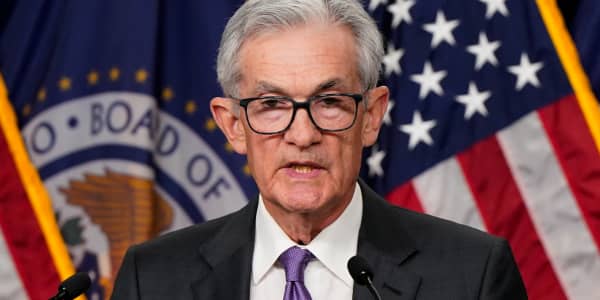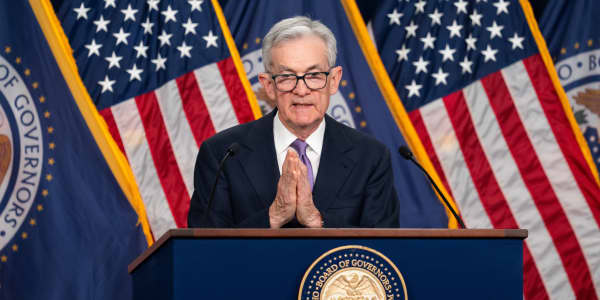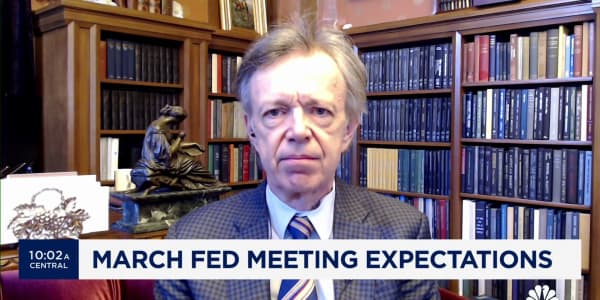
Respondents to a special election edition of the CNBC Fed Survey overwhelmingly believe that Hillary Clinton will win the White House and a plurality want her to win, yet they side with Donald Trump on many key economic issues.
The survey, conducted Thursday and Friday, suggests the recent email revelations surrounding Clinton have had little effect on the outlook for the presidential race. Among the 36 respondents, 78 percent believe Clinton will win the presidency compared with just 8 percent for Trump.
A CNBC Fed Survey conducted largely before those email reports found 82 percent expecting a Clinton victory. (The current survey was conducted before news broke Sunday evening that the FBI had found no new evidence in those emails.)
"Our assumption continues to be that Clinton wins the presidency," John Roberts, director of research of Hilliard Lyons, wrote in response to the current survey. "We are hoping that the Republicans hold both houses, although our base case is that Senate control moves to the Democrats."
By 46 percent to 23 percent, respondents say they want Clinton to win the presidency. In 2012, the survey found respondents wanted Republican nominee Mitt Romney to win.
In the current survey, respondents give Trump a slight 3-point edge on who has the best economic policies. They also favor his policies in three of five specific economic areas asked about in the survey: taxes, business regulation and jobs.
Clinton is judged to have the better polices on trade and budget deficits. And a Clinton victory is judged best for the stock market by 69 percent of respondents, compared with 25 percent for Trump.
For several months, the CNBC survey has found a split where Trump is seen as better for the economy and Clinton for the stock market. Many favor Trump's proposals for tax cuts and loosening business regulations. Yet they fear the trade policies and political instability that could be brought about by a Trump presidency. Respondents say the relative continuity and predictability of a Clinton presidency would be best for equities.
Just under half of respondents, who include economists, fund managers and strategists, say they will mark down their forecast for stock market gains for next year if Trump wins. Among those, the average markdown is about 10 percent to their year-end 2017 S&P 500 forecast. Just under a third of respondents say they won't change their stock market outlook and about a fifth say they will raise their forecasts. The average increase among this group is 8 percent.
But James Bianco, president of Bianco Research, is skeptical that markets will be hurt by a Trump victory. "Trump wins, think Brexit," Bianco wrote. "Everyone thought that would be bad for markets."
And Art Hogan, director of equity research of Wunderlich Securities, said: "We have had elections for 240 years and some crazy ones at that. The world keeps spinning. I bet that will be the case come November 9th."
Roughly two-thirds of respondents say they won't change their stock outlook at all if Clinton wins, a sign that the market expects such a victory. Just under a fifth said they would mark up their forecast by an average of 3 percent. Another fifth said they would lower their stocks market forecast by an average of 9 percent if Clinton wins.
A 46 percent plurality say divided government with a Democrat in the White House and Republicans controlling one or both houses of Congress is best for stocks and the economy. Roughly a third say unified government with Republicans controlling both is best.
Eight of 10 respondents said a President Trump would not reappoint Fed Chair Janet Yellen when her term expires in January 2018. Stanford University economist John Taylor was mentioned by three respondents as the most likely person to be named Fed chairman by Trump, followed by two votes for Trump economic advisor David Malpass. Others mentioned just once included former Fed Governor Kevin Warsh, Columbia University Business School Dean Glenn Hubbard and Harvard University economist Gregory Mankiw.
About 62 percent of respondents expect a President Clinton to reappoint Yellen. If Clinton decides to look elsewhere, a third say she'll appoint Fed Governor Lael Brainard to the post.
Most respondents believe a Clinton victory will result in almost no change to Fed policy. But there's a division about Trump. Eleven respondents think a Trump presidency means lower rates than they currently forecast for next year, nine respondents say higher and 15 say no change.
CORRECTION: A fifth of respondents say if Trump wins, they will raise their forecasts for the stock market on average by 8 percent. And if Clinton wins, a fifth of respondents said they would lower their forecasts by 9 percent.





